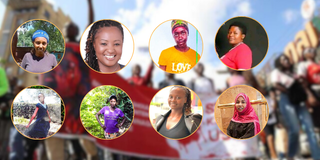Kenya confronts its femicide crisis: New task force proposes bold measures

(Top from left) femicide victims Beth Muthoni, Marianne Kilonzi, Precious Nderema and Winnie Akusuha. (Bottom from left) Ashley Wairimu, Jane Wanjiru, Lydia Tokesi and Aisha Abubakar.
What you need to know:
- Kenya’s National GBV Working Group proposes stronger policies, legal reforms, and increased funding to combat rising femicide and gender-based violence effectively.
- A presidential taskforce, led by Nancy Baraza, aims to address femicide by reviewing policies, enforcement gaps, and strengthening prevention strategies.
In the face of alarming femicide statistics, Kenya is taking unprecedented steps to protect its women and girls from deadly violence.
The National Gender-Based Violence Working Group has unveiled a comprehensive set of proposals aimed at stemming the rising tide of femicide across the country. These recommendations, submitted to President William Ruto's Technical Working Group on Gender-Based Violence (GBV), Including Femicide, represent a watershed moment in Kenya's fight against gender-based violence.
"The rising cases of GBV, with increased killings of women and girls, require strong whole-of-society approaches to safeguard their safety, justice, and protection," explains Mary Wanjiru, team lead for Ending Violence against Women and Girls at UN Women Kenya.
The proposals focus on four critical areas: strengthening coordination of GBV prevention and response efforts, implementing legal reforms, ensuring survivor-centred justice, and significantly increasing resource allocation.
Alberta Wambua, co-chair of the National GBV Working Group, emphasises that insufficient resources have been the biggest obstacle in addressing gender-based violence. "The recommendations include stronger coordination of GBV prevention and response; legal reforms and policy implementation; survivor-centred responses to ensure justice and protection for all; and increased resource allocation," she notes.
These recommendations come at a crucial time. According to the United Nations Office on Drugs and Crime, Kenya recorded 725 cases of femicide in 2024 alone—a staggering 2.66 deaths per 100,000 women. Even more disturbing, 47 women are killed weekly in Kenya, with approximately 75 per cent of these murders committed by someone known to the victim, such as an intimate partner, relative, or friend.
President Ruto acknowledged the severity of the crisis in January when he appointed former Deputy Chief Justice Nancy Baraza to lead a 34-member taskforce investigating the surge in gender-based violence.
Read more: Why femicide continues, and how to end it
The taskforce includes prominent figures such as Nairobi Women's Hospital founder Sam Thenya, Mohammed Washala, Ruth Aura, and Linah Kilimo. Other appointees include Edna Ngare, Nobert Talam, Linda Musumba, Anthony Nzioki, Anne Ngetich, Wangu Kanja, Bashir Isaak, Susan Ndanyi, Gloria Wawira, and Seth Masese.
"Such egregious violations pose a threat to our national security as well as strain the nation's social fabric," read the official Gazette notice announcing the taskforce's formation.
Given a 90-day timeline, the taskforce is expected to deliver its report to Deputy President Kithure Kindiki through the Gender Principal Secretary. Their mandate includes reviewing ongoing cases, accepting written submissions from the public, and collaborating with national government administration officers.
Collaboration
The government's commitment to addressing this crisis was further demonstrated in November last year when it pledged Sh100 million for an awareness campaign against gender violence. During a meeting with women MPs at State House in Nairobi, President Ruto called for nationwide collaboration in combating femicide.
Dr Sam Thenya, CEO of Nairobi Women Hospital, underscores the scale of the problem: "The economic burden of GBV is enormous on the economy. We must speak against this vice perpetuated against women and girls. They are our daughters, wives, sisters and mothers."
Describing femicide as a "national crisis," Dr Thenya revealed that the gender violence recovery centres operated by her hospital record an average of 4,000 GBV cases monthly.
As Mary Wanjiru points out, these new recommendations will create momentum for "assessing, reviewing, and proposing measures to strengthen the institutional, legal, and policy response to GBV and femicide." The working group has also outlined next steps for advocating and ratifying the African Union Convention on Ending Violence against Women and Girls.
With existing gaps in prevention, response, investigations, prosecution, data management, and survivor support systems, this coordinated approach marks a critical turning point in Kenya's battle against gender-based violence. The taskforce's findings may well determine whether Kenya can reverse the deadly trend that has claimed too many lives already.





